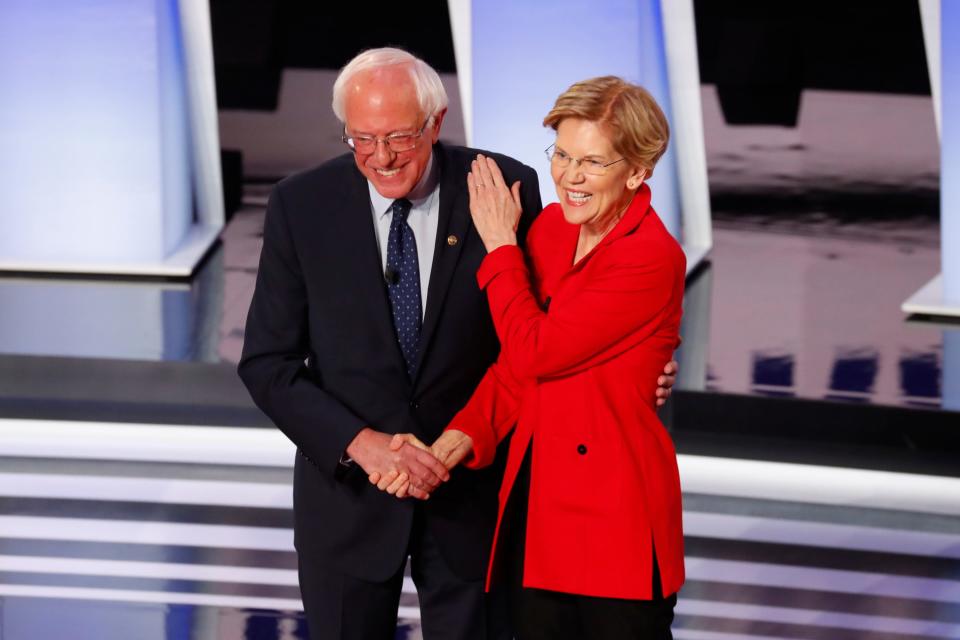Phase out nuclear power? Elizabeth Warren and Bernie Sanders locked in absurd arms race
Democrats, to their credit, are the one major party that cares about climate change. But it can be frustrating to watch as their presidential hopefuls get behind nonbinding policy papers or go wobbly on the hard decisions.
Perhaps nothing shows the lack of seriousness more than the candidates who play the anti-nuclear card even while claiming to be sincere about global warming.
Sen. Bernie Sanders of Vermont has a climate plan that calls nuclear energy a “false solution” and says it should be phased out by an unspecified date. Massachusetts Sen. Elizabeth Warren’s plan is mum on the issue. But, locked in a kind of arms race of impracticalities with Sanders, Warren said at a recent CNN town hall on climate change that nuclear should be phased out by 2035.

GREEN AMERICA: Nuclear power is too costly and too risky
With 10 Democratic candidates set to square off in another debate Thursday night, more bad-mouthing of nuclear is possible in an appeal to progressives who have trouble distinguishing between atomic bombs and atomic energy.
Nuclear is an important part of the puzzle in weaning the nation’s power grid off fossil fuels. At the very least, it needs to retain its place. And if a new generation of smaller and simpler reactors can be developed, an expansion of nuclear's role should be considered.
Nuclear is America’s third largest electricity source, behind natural gas and coal. It accounts for nearly 20% of our power. If it were eliminated, wind and solar would have to be more than doubled just to make up for its loss — while making no progress in cutting carbon emissions.
What’s more, wind and solar, while ideal in many respects, have shortcomings: Solar is regional and seasonal. Most of its production is in the Sun Belt and drops off precipitously in winter. Wind can disappear for days at a time. Both need backup sources that can rise when they fall and fall when they rise. At present, the only power sources with this flexibility are fossil fuels.
Wind and solar, which collectively account for about 8% of the U.S. power supply, can and should be greatly increased. Given their limitations, however, they are not going to produce the bulk of our power any time soon.
Hydropower could pick up some of the slack, yet we don't hear a hue and cry to build more dams.
Which brings us back to to nuclear.
While it does have the vice of the radioactive waste it produces and the potential for catastrophic meltdowns, it is not without its virtues. In addition to not emitting any carbon, nuclear (along with hydro) produces a lot of power at night because it can’t be easily turned off. This means that people who live in areas powered by nuclear or hydro who buy electric cars can charge them at night with zero-emissions power.
The record on getting rid of nuclear power has been disastrous. After the 2011 disaster at the Fukushima plant in Japan, Germany decided to get rid of its plants. It has shut down eight and vows to close nine that remain. While Germany, to its credit, is ahead of the USA on renewables, the plant closures make the nation more reliant on coal.
The first rule of dealing with any problem is to not make it worse. The second is to think broadly and creatively about all of the solutions that are available. Nuclear power comes into play in both.
USA TODAY's editorial opinions are decided by its Editorial Board, separate from the news staff. Most editorials are coupled with an opposing view — a unique USA TODAY feature.
To read more editorials, go to the Opinion front page or sign up for the daily Opinion email newsletter. To respond to this editorial, submit a comment to letters@usatoday.com.
If you can't see this reader poll, please refresh your page.
What do you think of our view on nuclear power?
This article originally appeared on USA TODAY: No nuclear power? Elizabeth Warren, Bernie Sanders in absurd arms race

